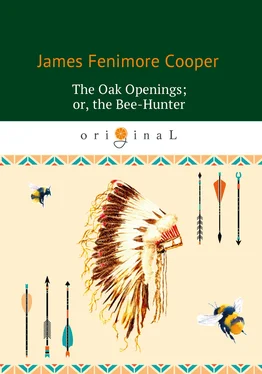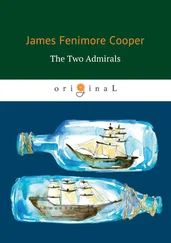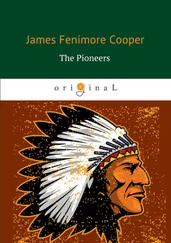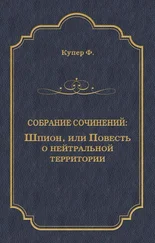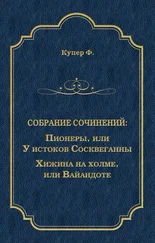No attempt was made to bury the remains of Elksfoot, inasmuch as our adventurers had no tools fit for such a purpose, and any merely superficial interment would have been a sort of invitation to the wolves to dig the body up again.
“Let him lean ag’in’ the tree,” said Waring, as they moved on toward the spot where the carcass of the deer was left, “and
I’ll engage nothin’ touches him. There’s that about the face of man, Bourdon, that skears the beasts; and if a body can only muster courage to stare them full in the eye, one single human can drive before him a whull pack of wolves.”
“I’ve heard as much,” returned the bee-hunter, “but should not like to be the ‘human’ to try the experiment That the face of man may have terrors for a beast, I think likely; but hunger would prove more than a match for such fear. Yonder is our venison, Waring; safe where I left it.”
The carcass of the deer was divided, and each man shouldering his burden, the two returned to the river, taking care to avoid the path that led by the body of the dead Indian. As both labored with much earnestness, everything was soon ready, and the canoe speedily left the shore. The Kalamazoo is not in general a swift and turbulent stream, though it has a sufficient current to carry away its waters without any appearance of sluggishness. Of course, this character is not uniform, reaches occurring in which the placid water is barely seen to move; and others, again, are found, in which something like rapids, and even falls, appear. But on the whole, and more especially in the part of the stream where it was, the canoe had little to disturb it, as it glided easily down, impelled by a light stroke of the paddle.
The bee-hunter did not abandon his station without regret. He had chosen a most agreeable site for his chiente, consulting air, shade, water, verdure, and groves, as well as the chances of obtaining honey. In his regular pursuit he had been unusually fortunate; and the little pile of kegs in the centre of his canoe was certainly a grateful sight to his eyes. The honey gathered this season, moreover, had proved to be of an unusually delicious flavor, affording the promise of high prices and ready sales. Still, the bee-hunter left the place with profound regret. He loved his calling; he loved solitude to a morbid degree, perhaps; and he loved the gentle excitement that naturally attended his “bee-lining,” his discoveries, and his gains. Of all the pursuits that are more or less dependent on the chances of the hunt and the field, that of the bee-hunter is of the most quiet and placid enjoyment. He has the stirring motives of uncertainty and doubt, without the disturbing qualities of bustle and fatigue; and, while his exercise is sufficient for health, and for the pleasures of the open air, it is seldom of a nature to weary or unnerve. Then the study of the little animal that is to be watched, and, if the reader will, plundered, is not without a charm for those who delight in looking into the wonderful arcana of nature. So great was the interest that le Bourdon sometimes felt in his little companions, that, on three several occasions that very summer, he had spared hives after having found them, because he had ascertained that they were composed of young bees, and had not yet got sufficiently colonized to render a new swarming more than a passing accident. With all this kindness of feeling toward his victims, Boden had nothing of the transcendental folly that usually accompanies the sentimentalism of the exaggerated, but his feelings and impulses were simple and direct, though so often gentle and humane. He knew that the bee, like all the other inferior animals of creation, was placed at the disposition of man, and did not scruple to profit by the power thus beneficently bestowed, though he exercised it gently, and with a proper discrimination between its use and its abuse.
Neither of the men toiled much, as the canoe floated down the stream. Very slight impulses served to give their buoyant craft a reasonably swift motion, and the current itself was a material assistant. These circumstances gave an opportunity for conversation, as the canoe glided onward.
“A’ter all,” suddenly exclaimed Waring, who had been examining the pile of kegs for some time in silence – “a’ter all, Bourdon, your trade is an oncommon one! A most extr’ornary and oncommon callin’!”
“More so, think you, Gershom, than swallowing whiskey, morning, noon, and night?” answered the bee-hunter, with a quiet smile.
“Aye, but that’s not a reg’lar callin’; only a likin’! Now a man may have a likin’ to a hundred things in which he don’t deal. I set nothin’ down as a business, which a man don’t live by.”
“Perhaps you’re right, Waring. More die by whiskey than live by whiskey.”
Whiskey Centre seemed struck with this remark, which was introduced so aptly, and was uttered so quietly. He gazed earnestly at his companion for near a minute, ere he attempted to resume the discourse.
“Blossom has often said as much as this,” he then slowly rejoined; “and even Dolly has prophesized the same.”
The bee-hunter observed that an impression had been made, and he thought it wisest to let the reproof already administered produce its effect, without endeavoring to add to its power. Waring sat with his chin on his breast, in deep thought, while his companion, for the first time since they had met, examined the features and aspect of the man. At first sight, Whiskey Centre certainly offered little that was inviting; but a closer study of his countenance showed that he had the remains of a singularly handsome man. Vulgar as were his forms of speech, coarse and forbidding as his face had become, through the indulgence which was his bane, there were still traces of this truth. His complexion had once been fair almost to effeminacy, his cheeks ruddy with health, and his blue eye bright and full of hope. His hair was light; and all these peculiarities strongly denoted his Saxon origin. It was not so much Anglo-Saxon as Americo-Saxon, that was to be seen in the physical outlines and hues of this nearly self-destroyed being. The heaviness of feature, the ponderousness of limb and movement, had all long disappeared from his race, most probably under the influence of climate, and his nose was prominent and graceful in outline, while his mouth and chin might have passed for having been under the chisel of some distinguished sculptor. It was, in truth, painful to examine that face, steeped as it was in liquor, and fast losing the impress left by nature. As yet, the body retained most of its power, the enemy having insidiously entered the citadel, rather than having actually subdued it. The bee-hunter sighed as he gazed at his moody companion, and wondered whether Blossom had aught of this marvellous comeliness of countenance, without its revolting accompaniments.
All that afternoon, and the whole of the night that succeeded, did the canoe float downward with the current. Occasionally, some slight obstacle to its progress would present itself; but, on the whole, its advance was steady and certain. As the river necessarily followed the formation of the land, it was tortuous and irregular in its course, though its general direction was toward the northwest, or west a little northerly. The river-bottoms being much more heavily “timbered” – to use a woodsman term – than the higher grounds, there was little of the park-like “openings” on its immediate banks, though distant glimpses were had of many a glade and of many a charming grove.
As the canoe moved toward its point of destination, the conversation did not lag between the bee-hunter and his companion. Each gave the other a sort of history of his life; for, now that the jug was exhausted, Gershom could talk not only rationally, but with clearness and force. Vulgar he was, and, as such, uninviting and often repulsive; still his early education partook of that peculiarity of New England which, if it do not make her children absolutely all they are apt to believe themselves to be, seldom leaves them in the darkness of a besotted ignorance. As usually happens with this particular race, Gershom had acquired a good deal for a man of his class in life; and this information, added to native shrewdness, enabled him to maintain his place in the dialogue with a certain degree of credit. He had a very lively perception – fancied or real – of all the advantages of being born in the land of the Puritans, deeming everything that came of the great “Blarney Stone” superior to everything else of the same nature elsewhere; and, while much disposed to sneer and rail at all other parts of the country, just as much indisposed to “take,” as disposed to “give.” Ben Boden soon detected this weakness in his companion’s character, a weakness so very general as scarce to need being pointed out to any observant man, and which is almost inseparable from half-way intelligence and provincial self-admiration; and Ben was rather inclined to play on it, whenever Gershom laid himself a little more open than common on the subject. On the whole, however, the communications were amicable; and the dangers of the wilderness rendering the parties allies, they went their way with an increasing confidence in each other’s support. Gershom, now that he was thoroughly sober, could impart much to Ben that was useful; while Ben knew a great deal that even his companion, coming as he did from the chosen people, was not sorry to learn. As has been, already intimated, each communicated to the other, in the course of this long journey on the river, an outline of his past life.
Читать дальше
